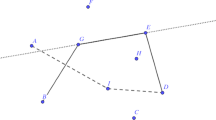Abstract
We introduce the notion of a c-sensitive triangulation based on the local notion of a c-sensitive triangulation edge. We show that any c-sensitive triangulation of a planar point set approximates the minmax length triangulation of the set within the factor 2(c+1). On the other hand we prove that the greedy triangulation and the Dclaunay triangulation of a planar straight-line graph are respectively 4-sensitive and 1-sensitive. We also generalize the relationship between c-sensitive triangulations and the minmax length triangulation to include appropriately augmented planar straight-line graphs. This enables us to obtain a O(n) log n)-time heuristic for the minmax length triangulation of an arbitrary planar straight-line graph with the approximation factor bounded by 3. A modification of the above heuristic for simple polygons runs in linear time.
This work was partially supported by NFR, STU, STUF and TFR.
Preview
Unable to display preview. Download preview PDF.
Similar content being viewed by others
References
J. Bramble and M. Zlamal. Triangular elements in the finite element method. Math. Computation 24 (1970), pp. 809–820.
B. Chazelle. Triangulating a Simple Polygon in Linear Time. Proc. 31st IEEE FOCS Symposium, 1990.
B. Delaunay. Sur la sphere vide. Izv. Akad. Nauk SSSR, Otdelenic Mathematicheskii i Estestvennyka Nauk 7 (1934), pp. 793–800.
G. Das and D. Joseph. Which Triangulations Approximate the Complete Graph? In Proc. Int. Symp. on Optimal Algorithms, LNCS 401, pp. 168–192, Springer Verlag.
H. Edelsbrunner. Algorithms in Combinatorial Geometry. EATCS Monographs on Theoretical Computer Science 10, 1987, Springer Verlag.
H. Edelsbrunner and T. S. Tan. A Quadratic Time Algorithm for the MinMax Length Triangulation. In Proc. 32nd Ann. IEEE Sympos. Found. Comput. Sci., 1991, pp. 414–423.
H. Edelsbrunner, T. S. Tan and R. Waupotisch. An O(n2 log n) time algorithm for the minmax angle triangulation. In Proc. 6th Ann. Sympos. Comput. Geom., 1990, pp. 44–52.
D.G. Kirkpatrick, A Note on Delaunay and Optimal Triangulations. IPL, Vol. 10, No. 3, pp. 127–131.
R. Klein and A. Lingas On Computing Voronoi Diagrams for Simple Polygons. To appear in Proc. 8th ACM Symposium on Computational Geometry, Berlin, 1992.
G. T. Klincsek. Minimal triangulations of polygonal domains. Annals Discrete Math. 9 (1980), pp. 121–123.
D.T. Lee. Two-Dimensional Voronoi Diagrams in the L p-metric. JACM, 27(4), 1980, pp. 604–618.
D.T. Lee and A. Lin. Generalized Delaunay Triangulations for Planar Graphs. Discrete and Computational Geometry 1, 1986, Springer Verlag, pp. 201–217.
C. Levcopoulos and A. Lingas. On approximation behavior of the greedy triangulation for convex polygons. Algorithmica 2, 1987, pp. 175–193.
C. Levcopoulos and A. Lingas. Fast Algorithms for Greedy Triangulation. Proc. SWAT'90, Lecture Notes in Computer Science 447, Springer Verlag, pp. 238–250.
A. Lingas. A new heuristic for minimum weight triangulation. SIAM J. Algebraic Discrete Methods 8 (1987), pp. 646–658.
F.P. Preparata and M.I. Shamos. Computational Geometry: An Introduction. Texts and Monographs in Theoretical Computer Science, Springer Verlag, New York, 1985.
V. T. Rajan. Optimality of the Delaunay Triangulation in R d. In Proc. 7th Ann. Sympos. Comput. Geom., 1991, pp. 357–363.
R. Sibson. Locally equiangular triangulations. Comput. J. 21 (1978), pp. 243–245.
F. W. Wilson, R. K. Goodrich and W. Spratte. Lawson's triangulation is nearly optimal for controlling error bounds. SIAM J. Numer. Anal. 27 (1990), pp. 190–197.
C. Wang and L. Schubert. An Optimal Algorithm for Constructing the Delaunay Triangulation of a Set of Line Segments. Proc. 3rd ACM Symposium on Computational Geometry, Waterloo, pp. 223–232, 1987.
Author information
Authors and Affiliations
Editor information
Rights and permissions
Copyright information
© 1992 Springer-Verlag Berlin Heidelberg
About this paper
Cite this paper
Levcopoulos, C., Lingas, A. (1992). C-sensitive triangulations approximate the minmax length triangulation. In: Shyamasundar, R. (eds) Foundations of Software Technology and Theoretical Computer Science. FSTTCS 1992. Lecture Notes in Computer Science, vol 652. Springer, Berlin, Heidelberg. https://doi.org/10.1007/3-540-56287-7_98
Download citation
DOI: https://doi.org/10.1007/3-540-56287-7_98
Published:
Publisher Name: Springer, Berlin, Heidelberg
Print ISBN: 978-3-540-56287-0
Online ISBN: 978-3-540-47507-1
eBook Packages: Springer Book Archive




